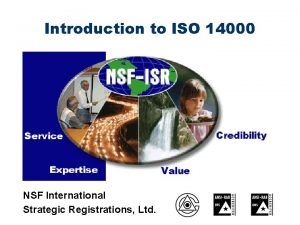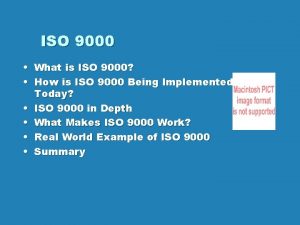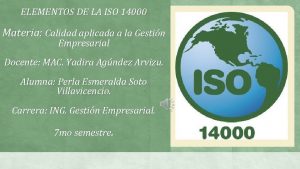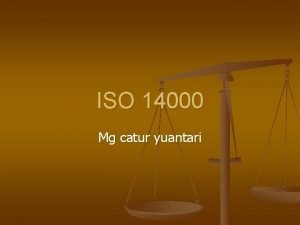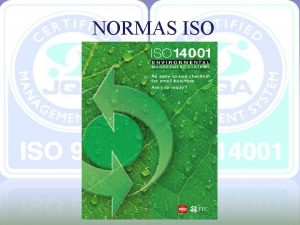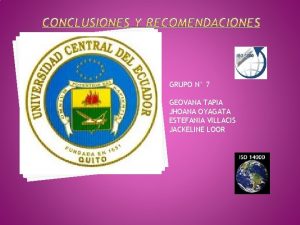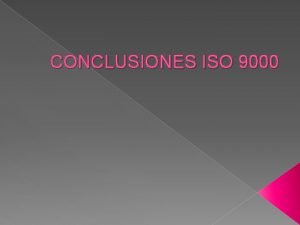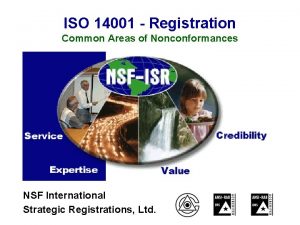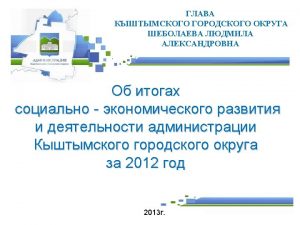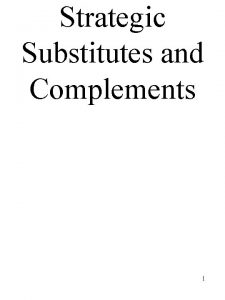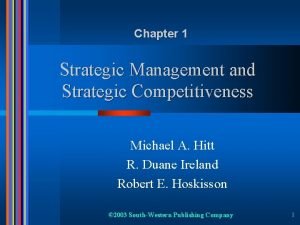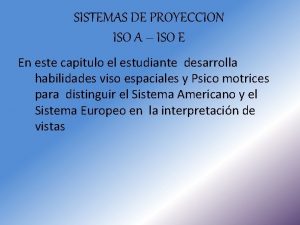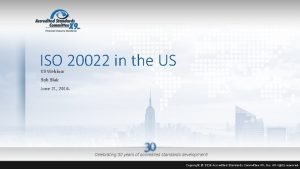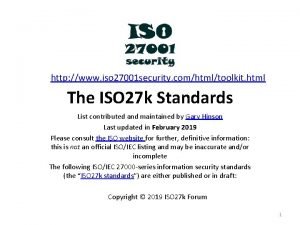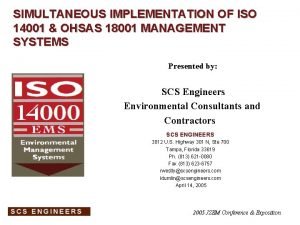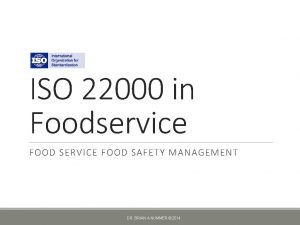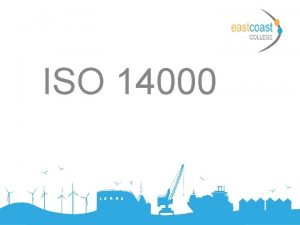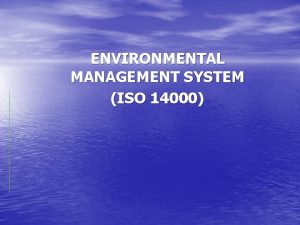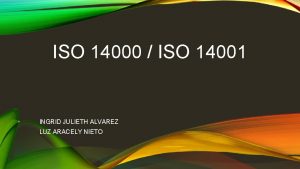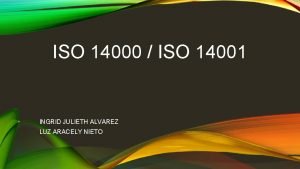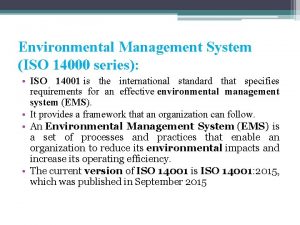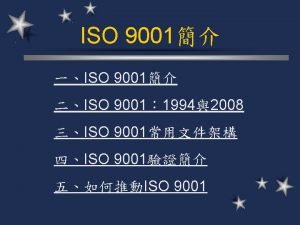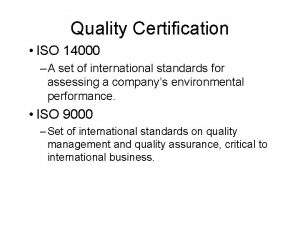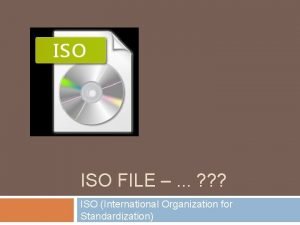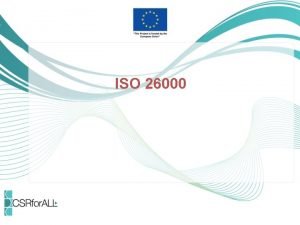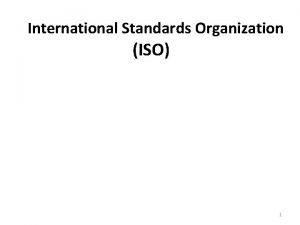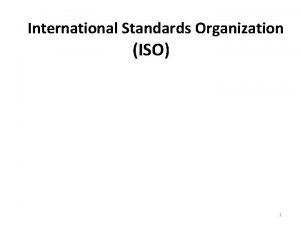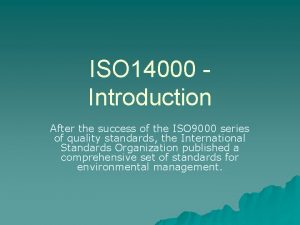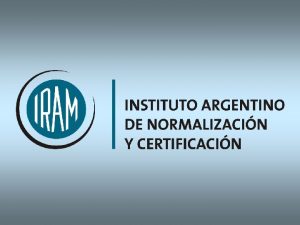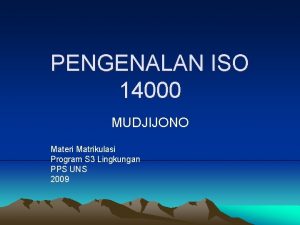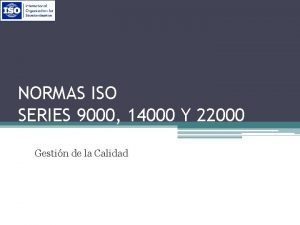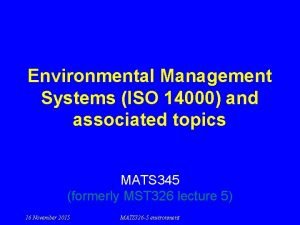Introduction to ISO 14000 NSF International Strategic Registrations






















- Slides: 22

Introduction to ISO 14000 NSF International Strategic Registrations, Ltd.

International Organization for Standardization (ISO) n Worldwide federation of national standards bodies from over 100 countries, one from each country. n Non-governmental organization (NGO) established in 1947, based in Geneva, Switzerland. n American National Standards Institute (ANSI) is US representative to ISO

History n 1987 - World Commission on Environment & Development (AKA The Brundtland Commission) published “Our Common Future”. – called for the development of effective environmental management systems by industries n 1989 - Creation of Strategic Advisory Group on the Environment (SAGE) – Recommended new ISO Technical Committee to develop standards for environmental management n January 1993 - ISO creates TC 207 – (TC 176 controls ISO 9000 QMS standards) n Fall 1996 – ISO 14001 adopted

Sub-Committees of TC 207 n n n SC 1: EMS - UK SC 2: Env. Auditing - Netherlands SC 3: Env. Labeling - Australia SC 4: Env. Performance Evaluation US SC 5: Life Cycle Assessment - France SC 6: Terms and Definitions - Norway

ISO 14000 Standards n ISO 14000 is a series of standards, rather than a single standard. – 14001: Environmental Management Systems – 14004: EMS general guidelines – 14010: Guidelines for Environmental Auditing – 14011: Guidelines for Auditing of an EMS – 14012: Auditing - Qualification criteria – Others deal with life cycle assessment, site assessments, labeling, and other matters.

To whom do the standards apply? n The ISO 14000 standards can be applied to: – large and small business & industry; – service sectors (hospitals, hotels, etc. ); – government organizations; – all types of organizations, of all sizes anywhere in the world.

What is an EMS? n An EMS is: – a systematic way of managing an organization’s environmental aspects; – based on the Plan-Do-Check-Act (PDCA) model; – focused on continual improvement of systems; – a way to address immediate and long-term impact of an organization’s products, services and activities on the environment; – a tool to improve environmental performance.

Internal Drivers for ISO 14001 n An EMS: – helps track and satisfy regulatory requirements; – supports effective delegation of responsibilities; – reduces disruption caused by employee turnover; – establishes a framework to move beyond compliance; – provides a vehicle for positive change, improved employee morale, enhanced public image; – helps identify opportunities for savings; – consolidates existing environmental, safety, and health programs into a cohesive system.

External Drivers for ISO 14001 n Requirements from customers – e. g. IBM, Xerox, Bristol-Myers Squibb, Ford, GM, Honda, Volvo, and others n n n Agreements with regulators Trade barrier reduction Enhanced public image

Becoming ISO 14001 registered n n n ISO 14001 is the only certification standard. The registration body examines EMS for conformity to the ISO 14001 standard. The EMS audit is not a compliance audit. Registration does NOT mean that products are more environmentally friendly. Registration means the organization has a documented EMS that is fully implemented and meets ISO 14001 requirements. The registration covers processes, not products.

World Picture n n n 15, 281 ISO 14001 reg. in world as of 3/00 740 ISO 14001 reg. in US as of 3/00 US is 5 th in number of registrations behind Japan (3, 318), Germany (1, 950), Sweden (1, 025), UK (1, 014)

ISO 14001 - 17 Key Elements n Environmental Policy – requires a publicly available, written statement, which includes a commitment to prevention of pollution, continual improvement, and compliance with environmental laws and other applicable environmental requirements; n Environmental Aspects – requires procedures for identification of environmental aspects of the organization's activities and determination of those which have or can have significant impacts on the environment;

ISO 14001 - Definitions n Environmental aspect – element of an organization’s activities, products or services that can interact with the environment • Note - A significant environmental aspect is an environmental aspect that has or can have a significant environmental impact. n Environmental impact – any change to the environment, whether adverse or beneficial, wholly or partially resulting from an organization’s activities, products or services

ISO 14001 - 17 Key Elements n Legal and Other Requirements – requires the organization to know exactly what environmental laws and other (i. e. non-regulatory) requirements apply to its activities; n Objectives and Targets – requires the organization to set measurable environmental objectives and targets consistent with its environmental policy statement;

ISO 14001 - Definitions n Environmental objective – overall environmental goal, arising from the environmental policy, that an organization sets itself to achieve, and which is quantified where practicable n Environmental target – detailed performance requirement, quantified where practicable, applicable to the organization or parts thereof, that arises from the environmental objectives and that needs to be set and met in order to achieve those objectives

ISO 14001 - 17 Key Elements n Environmental Management Programs – requires the organization to develop and maintain programs to achieve its environmental objectives and targets; n Structure and Responsibility – requires environmental management responsibilities to be clearly defined, documented, and communicated;

ISO 14001 - 17 Key Elements n Training, Awareness, and Competence – requires processes to ensure that all personnel whose work can cause significant impacts on the environment are competent, through training, education and experience; n Communication – requires procedures for internal and external communication on environmental aspects;

ISO 14001 - 17 Key Elements n EMS Documentation – requires documentation of core EMS elements; n Document Control – requires stringent control of all documentation relating to the EMS;

ISO 14001 - 17 Key Elements n Operational Control – requires identification of all activities with potential or actual significant environmental impact and procedural control of such activities to achieve conformance with the environmental policy. This includes environmental control of goods and services provided by suppliers and subcontractors; n Emergency Preparedness and Response – requires identification of potential for accidents and emergency situations, and procedures for response and mitigation of resulting environmental impacts;

ISO 14001 - 17 Key Elements n Monitoring and Measurement – requires documented procedures to measure environmental aspects to check progress toward meeting environmental objectives and targets, and for evaluating compliance with regulatory requirements; n Nonconformance and Corrective and Preventive Action – requires procedures for taking preventive and corrective action on any EMS nonconformances and supports continual improvement of the system;

ISO 14001 - 17 Key Elements n Records – requires procedures for handling and disposition of environmental records; n EMS Audit – requires the organization to periodically audit itself for conformance with the requirements of its EMS; n Management Review – requires top management to periodically review the EMS for effectiveness in achieving the intent of the environmental policy and identify the need for changes to the system.

For More Information n n DPPEA offers free on-site EMS assistance and training DPPEA EMS web site http: //www. p 2 pays. org/iso/index. htm Beth Graves, EMS Project Coor. 919 -715 -6506 or 800 -763 -0136 Beth. Graves@ncmail. net Rick Gehrke at NSF-ISR, Southeast: 888 -248 -0433 for registration questions
 Nsf international strategic registrations
Nsf international strategic registrations Iso 9000 norma
Iso 9000 norma Benefits of iso 14000
Benefits of iso 14000 Familia iso 14000
Familia iso 14000 Luz isao
Luz isao Que es la iso
Que es la iso Sello verde iso 14000
Sello verde iso 14000 Conclusiones y recomendaciones de las normas iso
Conclusiones y recomendaciones de las normas iso Nsf strategic plan
Nsf strategic plan عید 14001
عید 14001 14000-4500
14000-4500 13000/12000
13000/12000 Strategic fit vs strategic intent
Strategic fit vs strategic intent Puppy dog ploy strategy
Puppy dog ploy strategy Strategic competitiveness
Strategic competitiveness Analysing the 6 strategic options megxit
Analysing the 6 strategic options megxit Sistema iso-e
Sistema iso-e Iso 8583 to iso 20022 mapping
Iso 8583 to iso 20022 mapping Iso 27100 certification
Iso 27100 certification Iso 9001 iso 14001 ohsas 18001 comparison
Iso 9001 iso 14001 ohsas 18001 comparison What is the objective of iso 22000? *
What is the objective of iso 22000? * Global marketing management planning and organization
Global marketing management planning and organization Global international issues in strategic management
Global international issues in strategic management
